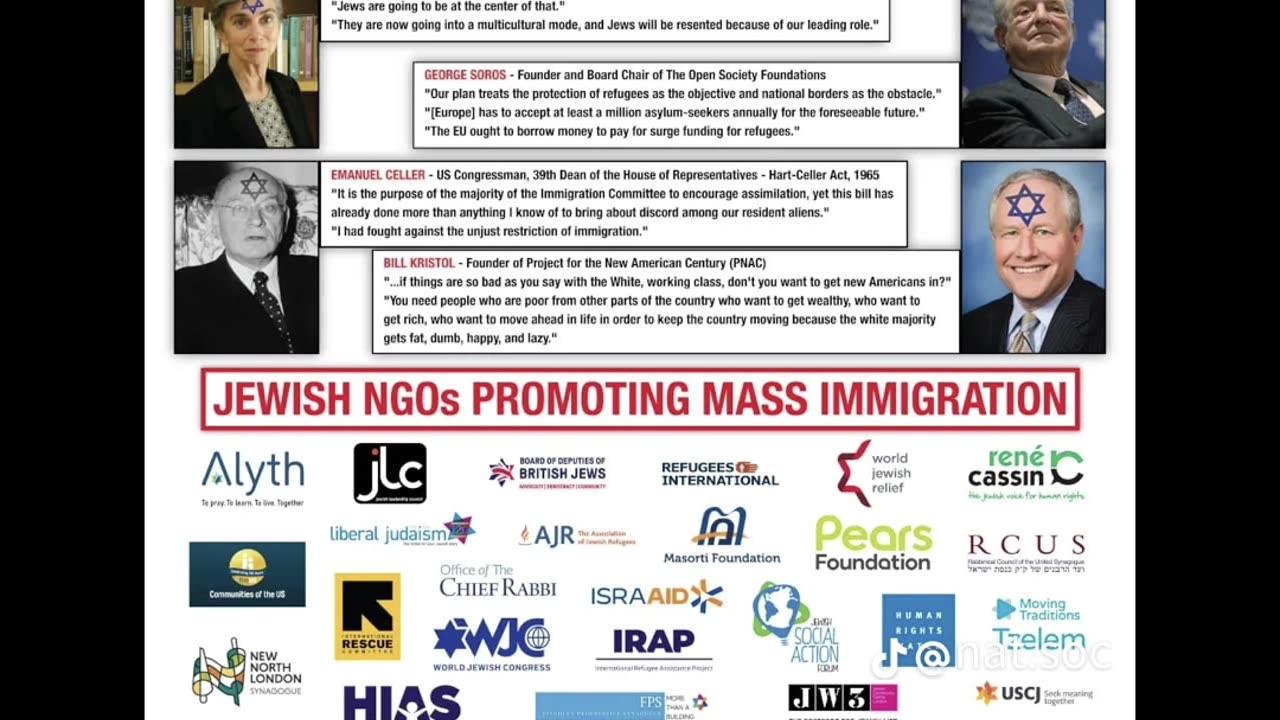Premium Only Content

Hitler's Speech at the Women's Conference - October 7, 1934
Background Leading Up to Hitler's Speech at the Women's Conference - October 7, 1934
Nazi Ideology on Gender Roles: The Nazi regime had a specific vision for the role of women in society, emphasizing traditional gender roles. Women were encouraged to focus on "Kinder, Küche, Kirche" (children, kitchen, church), reflecting the regime’s desire to promote large families and traditional domestic responsibilities.
Consolidation of Power: By 1934, Hitler had firmly established his control over Germany. The Nazi regime had begun to implement widespread social and economic policies aligned with its ideological goals, including those aimed at shaping the roles of women.
Economic Recovery and Propaganda: Germany was undergoing economic recovery through public works programs and rearmament, which the regime used as evidence of its success and justification for its policies. Propaganda efforts were in full swing, promoting Nazi ideals and garnering support for Hitler’s vision.
Key Points of Hitler's Speech:
Role of Women in Nazi Germany: Hitler emphasized the importance of women in the Nazi vision for Germany. He praised women for their role in maintaining the family unit and raising the next generation of Germans, portraying this as a vital contribution to the nation’s future.
Motherhood and Family: A central theme of the speech was the glorification of motherhood. Hitler argued that the most honorable and significant role for women was to be mothers, nurturing and educating their children to become loyal and strong citizens.
Support for National Policies: Hitler highlighted the importance of women’s support for Nazi policies. He emphasized that women’s involvement in community and social organizations was crucial for the success of the regime’s goals.
Economic Contributions: While reinforcing traditional roles, Hitler also acknowledged the economic contributions of women, particularly in times of need. He stressed that women could support the nation by working in industries and services that aligned with their nurturing roles.
National Unity and Sacrifice: Emphasizing national unity, Hitler called on women to make sacrifices for the greater good of Germany. He portrayed their traditional roles as essential to the strength and unity of the nation, urging them to dedicate themselves fully to their families and communities.
Analysis:
Promotion of Traditional Roles: Hitler’s speech was a strategic effort to reinforce traditional gender roles within the framework of Nazi ideology. By glorifying motherhood and domestic responsibilities, he aimed to mobilize women’s support for the regime’s broader social and political objectives.
Integration into the Nazi Vision: By highlighting the importance of women’s roles, Hitler sought to integrate them into the Nazi vision for Germany’s future. He portrayed their contributions as indispensable to the success of the nation, thus fostering a sense of purpose and importance among women.
Balancing Roles and Economic Needs: Acknowledging women’s economic contributions while emphasizing traditional roles demonstrated a pragmatic approach. Hitler recognized the economic reality of the time and aimed to balance it with the ideological emphasis on family and motherhood.
National Unity: The call for national unity and sacrifice was consistent with Hitler’s broader strategy of mobilizing all segments of society. By appealing to women’s sense of duty and patriotism, he aimed to strengthen the regime’s social cohesion and resilience.
Propaganda Effort: The speech was also a part of the larger propaganda effort to promote Nazi ideals and to secure broad-based support. By addressing women directly, Hitler aimed to ensure their active participation in the regime’s agenda and to cultivate loyalty among a significant portion of the population.
Overall, Hitler's speech at the Women's Conference on October 7, 1934, was a carefully crafted address that reinforced traditional gender roles, highlighted the importance of women’s contributions to the nation, and integrated these themes into the broader Nazi vision of national unity and strength.
-
 LIVE
LIVE
Flyover Conservatives
11 hours agoIs THE Church Necessary? What is the Church? 5 Fold Ministry. - Wanda Alger | FOC Show
284 watching -
 LIVE
LIVE
The Shannon Joy Show
2 hours ago🔥🔥Small Town Activists HALT Geo-Engineering Scheme In Alameda, California PROVING That Localism Beats Globalism!🔥
167 watching -
 LIVE
LIVE
Grant Stinchfield
59 minutes agoThe War on Real Food... How Corporate Giants Hijacked Your Dinner Plate
149 watching -
 LIVE
LIVE
Trumpet Daily
51 minutes agoTrumpet Daily LIVE - July 29, 2025
523 watching -
 LIVE
LIVE
JuicyJohns
4 hours ago $2.03 earned🟢#1 REBIRTH PLAYER 10.2+ KD🟢 !loadout
108 watching -
 DVR
DVR
Bannons War Room
5 months agoWarRoom Live
30.3M7.45K -
 8:36
8:36
Warren Smith - Secret Scholar Society
1 day agoTikTok's Biggest Political Star Goes Too Far & Blows Up His Own Career
16.7K11 -
 56:42
56:42
VSiNLive
2 hours ago $0.65 earnedA Numbers Game with Gill Alexander | Hour 1
17.3K -
 1:21:41
1:21:41
The Big Mig™
5 hours agoAct Blue, Magic Mortgage Money Laundering Scheme
13.4K5 -
 2:03:57
2:03:57
Matt Kohrs
12 hours agoMARKET OPEN: Stocks Rocket, Trade War News & Earnings Season || Live Trading
33.1K2